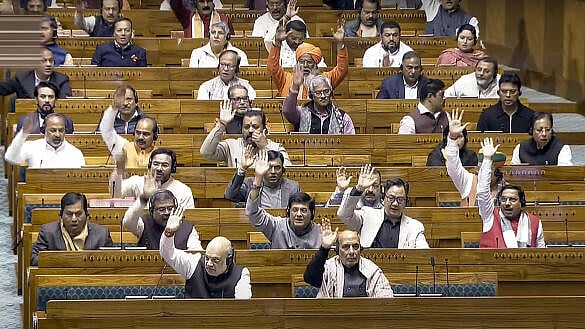
Union Ministers Amit Shah, Rajnath Singh, Piyush Goyal, Kiren Rijiju, and other members in the Lok Sabha during the Winter session of Parliament, in New Delhi, on Tuesday.
Credit: PTI Photo
NEW Delhi: The Narendra Modi government on Tuesday introduced two contentious Bills to hold simultaneous elections to Lok Sabha and state Assemblies after a fiery debate and vote, with the Opposition terming it “dictatorial” and “anti-federal” and Law Minister Arjun Ram Meghwal defending it claiming that it did not tamper with the powers of states.
The government managed 263 votes against Opposition's 198 on the question of whether the Bill could be introduced in the House but it fell far below the two-third majority required for passing the Constitution (129th Amendment) Bill, 2024, one of the proposed legislations, at a later stage.
Second one, The Union Territories Laws (Amendment) Bill, 2024 requires only a simple majority for passage. Prime Minister Narendra Modi and Leader of Opposition Rahul Gandhi were not present when the Bills were introduced.
Opposition parties were against the idea of ‘One Nation, One Election’ claiming that it was against Constitution’s basic structure, gives the Election Commission unbridled powers to decide on when to hold elections to states, makes states subordinate to the union government, lead to extinction of regional parties and undermines people's mandate.
Rebutting Opposition charges, Meghwal said the Bills “did not attack" the basic structure doctrine, as claimed by the Opposition. “Parliament's powers are not being curtailed. Because of politics, they are opposing the Bills,” he said defending Parliament’s power to bring in such legislation.
He said he would soon bring a detailed motion to send the two Bills to a Joint Committee of Parliament for further scrutiny after Home Minister Amit Shah told the House that Prime Minister Narendra Modi during the Cabinet meeting had wanted it to be sent to a panel for detailed discussion.
BJP allies TDP and the Shiv Sena also extended “unwavering support” to the Bills. Union Minister Chandra Shekhar Pemmasani (TDP) said simultaneous elections would reduce expenditure on polls while Shiv Sena MP Shrikant Shinde hit out at the Opposition, claiming they were “allergic to reforms”.
MPs of Congress, Samajwadi Party, DMK, Trinamool Congress, Muslim League, Shiv Sena (UBT), AIMIM, CPI(M), NCP (Sharadchandra Pawar) and RSP had submitted notices to oppose the introduction of the Bills.
Senior Congress MP Manish Tewari said the Bills were an “absolute assault” on the basic structure of Constitution and Parliament lacks legislative competence to enact such Bills. He said curtailing the tenure of an Assembly to enable simultaneous polls would be “antithesis to the Constitutional scheme” when states are “separate and equal constituents”.
Samajwadi Party's Dharmendra Yadav described the Bills as an attempt to bring “dictatorship” while insisting that the move was “anti-Constitution, anti-basic structure, anti-federal, anti-poor andti-backward and anti-Muslim”.
Trinamool Congress Chief Whip Kalyan Banerjee said state governments are “not subordinate” to the union government or Parliament. “This is not electoral reform, but it is just the fulfilment of one gentleman's desire," Banerjee said while AIMIM's Asaduddin Owaisi called it “draconian Bills”.
“This is to introduce the Presidential system. This Bill is aimed at maximising political gain and convenience. This Bill will finish off regional parties,” Owasi said.
DMK's TR Baalu remarked that the government does not have two-third majority and said the voters have the right to elect the government for five years and this right cannot be curtailed.
Raising concern over EC getting powers to decide on whether to hold election to a particular state along with Parliament, Shiv Sena (UBT)'s Anil Desai said competence of the Election Commissioners need to be checked while demanding that Election Commissioners be elected by people.
Muslim League's ET Mohammed Basheer expressed concern over the possibility of “local issues being put under back burner” during simultaneous polls while CPI(M)'s Amra Ram said the Bills would lead to dictatorship in the country.
NCP (SP)'s Supriya Sule asked how the Election Commission be given the power to dissolve an Assembly while RSP's NK Premachandran said the provisions in the Bills were “uncertain and not clear”. Premachandran said 17 Assembly elections would be held after 2029 and all of them have a curtailed tenure.
